

Recursos Tecnologicos: TIC. Las diferentes concepciones del DI son expresadas a través de los Modelos de Diseño Instruccional que sirven de guia a los profesionales sistematizando el proceso de desarrollo de acciones formativas.
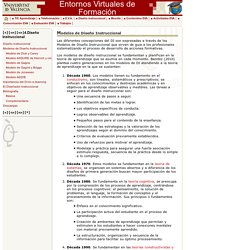
Los modelos de diseño instruccional se fundamentan y planifican en la teoría de aprendizaje que se asumía en cada momento. Benitez (2010) plantea cuatro generaciones en los modelos de DI atendiendo a la teoría de aprendizaje en la que se sustentan: Década 1960. Los modelos tienen su fundamento en el conductismo, son lineales, sistemáticos y prescriptivos; se enfocan en los conocimientos y destrezas académicas y en objetivos de aprendizaje observables y medibles.
Las tareas a seguir para el diseño instruccional son: Una secuencia de pasos a seguir.
#1 Instructional Design Community. International Journal of Educational Management. Sign in or Register. Collection of Papers on Quality in Higher Education. The 31 Educational Web Tools Every Teacher Should Know about. Below is a list I have been working on for the last couple of days.
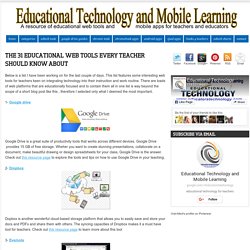
This list features some interesting web tools for teachers keen on integrating technology into their instruction and work routine. There are loads of web platforms that are educationally focused and to contain them all in one list is way beyond the scope of a short blog post like this , therefore I selected only what I deemed the most important. 1- Google drive Google Drive is a great suite of productivity tools that works across different devices. Google Drive provides 15 GB of free storage. 2- Dropbox. Multimedia Principles and PowerPoint - CATL Teaching Resources. Research on Multimedia Richard E.
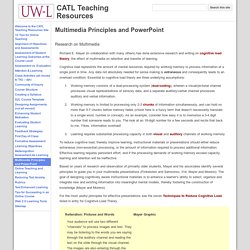
Mayer (in collaboration with many others) has done extensive research and writing on cognitive load theory, the effect of multimedia on retention and transfer of learning. Cognitive load represents the amount of mental resources required by working memory to process information at a single point in time. Any data not absolutely needed for sense making is extraneous and consequently leads to an overload condition.
Essential to cognitive load theory are three underlying assumptions: Guides and Tutorials – Center for Advancing Teaching and Learning (CATL) Guides and Tutorials – Center for Advancing Teaching and Learning (CATL) Welcome – CATL Teaching Guides. Welcome to the Teaching Guides websites prepared by the staff at the Center for Advancing Teaching & Learning at UW - La Crosse.
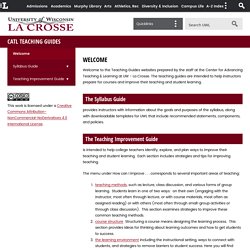
The teaching guides are intended to help instructors prepare for courses and improve their teaching and student learning. The Syllabus Guide provides instructors with information about the goals and purposes of the syllabus, along with downloadable templates for UWL that include recommended statements, components, and policies. The Teaching Improvement Guide is intended to help college teachers identify, explore, and plan ways to improve their teaching and student learning. The menu under How can I improve . . . corresponds to several important areas of teaching: Tools for Critical Reflection: Course Design Rubrics for Distance Education - Teaching Resources - Teaching Excellence.
Webexample. Instructional Design refers to the analysis of learning needs and the systemic approach of developing an online course in a manner that facilitates the transfer of knowledge and skills to the learner through the use of a variety of instructional methods, which relate to multiple learning styles, strategies, and preferences.
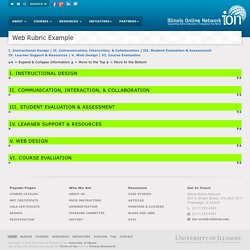
A. Structure 1. Sequence Content is sequenced and structured in a manner which enables learners to achieve the stated goals. 2. Information is "chunked" or grouped to help students learn the content. 3. Quality Online Course Initiative. ION and the Illinois Virtual Campus have taken the lead to develop a quality online course rubric and evaluation system in the state of Illinois.
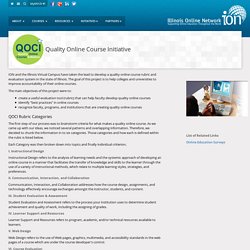
The goal of this project is to help colleges and universities to improve accountability of their online courses. The main objectives of this project were to: Middle Tennessee State University. Introduction Responsibilities Getting Started Course Development Course Approval Course Development Fees Scheduling Faculty Hiring and Required Training Instructional Resources Instructional Best Practices Testing MTSU faculty may propose development of online courses for the TN eCampus which is an educational collaborative initiated by the Tennessee Board of Regents (TBR) with the purpose of providing a central resource for exploration of online undergraduate and graduate courses and programs developed by the system’s thirteen two-year community colleges and six universities.
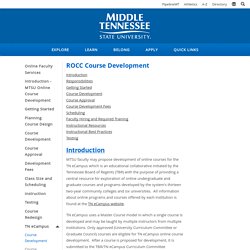
All information about online programs and courses offered by each institution is found at the TN eCampus website. TN eCampus uses a Master Course model in which a single course is developed and may be taught by multiple instructors from multiple institutions. Only approved (University Curriculum Committee or Graduate Council) courses are eligible for TN eCampus online course development.
Course Developer Manual. Tools for Critical Reflection: Course Design Rubrics for Distance Education - Teaching Resources - Teaching Excellence. A Compact Instructional Design Review Checklist - eLearning Industry. 12 Alternatives to GoAnimate. Moovly, Online Software to Create Animated Videos and Presentations. Educational Models.
DOCENCIA+TIC. Project Based Learning. Respuestas OSH: Gu�a para Redactar una Declaraci�n de Pol�tica OHS. Manual Diseño Curricular. Este Manual Cumple con el requisito del Art. 15 del Reglamento de Normalización Mayo del 2000 Este manual tiene como propósito principal facilitar y brindar la información, el conocimiento y el apoyo necesarios para que el desarrollo curricular de la institución se lleve a cabo en forma proactiva , con base en criterios técnicos y de acuerdo con los lineamientos institucionales.
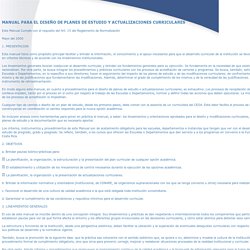
Los lineamientos generales buscan coadyuvar al desarrollo curricular, y brindan los fundamentos generales para su ejecución. Se fundamenta en la necesidad de que existan criterios de orden que lo racionalicen. Por otra parte, se busca integrar los procedimientos y prácticas curriculares con los procesos de acreditación de carreras y programas. En modo alguno este manual, en cuanto a procedimientos para el diseño de planes de estudio o actualizaciones curriculares, es exhaustivo. A. . La planificación, la organización, la estructuración y la presentación del plan curricular de cualquier opción académica. b.
C. D. RELOAD Project. Content Packaging. IMS Content Packaging v1.2 Public Draft v2.0 specification describes data structures that can be used to exchange data between systems that wish to import, export, aggregate, and disaggregate packages of content.
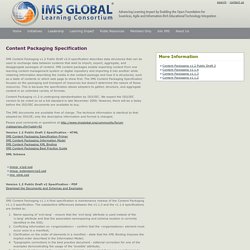
IMS content packages enable exporting content from one learning content management system or digital repository and importing it into another while retaining information describing the media in the content package and how it is structured, such as a table of contents or which web page to show first. The IMS Content Packaging Specification focuses on the packaging and transport of resources but doesn’t determine the nature of those resources. This is because the specification allows adopters to gather, structure, and aggregate content in an unlimited variety of formats. Content Packaging v1.2 is undergoing standardisation by ISO/IEC. We expect the ISO/IEC version to be voted on as a full standard in late November 2009. Please post comments or questions at XML Schema.
Using Google Tools in Project-Based Learning Infographic. Teacher Infographics Using Google Tools in Project-Based Learning Infographic.
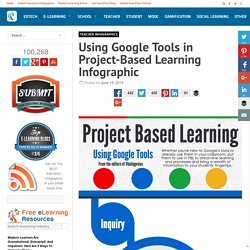
Rúbricas. E-learning. Educación basada en proyectos.